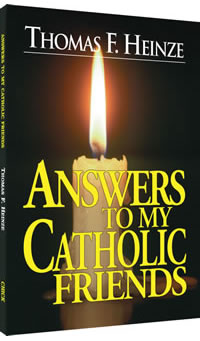Pope Invites World Religious Leaders to Assisi for Prayer
On January 24 this year, Pope John Paul II again illustrated his position as head of the Mother of Harlots and Abominations by inviting 200 delegates from 12 major world religions to Assisi, Italy to pray together for world peace.
They gathered under a huge plastic tent to mix Christian hymns and Buddhist chants before reading commitments to work for peace in 11 languages from Arabic to Hebrew to Farsi and Punjabi.
According to the Associated Press, the gathering was one of the largest ever of "Christian groups, bringing together Catholics, Baptists, Lutherans, Quakers and Mennonites, among others, along with Orthodox Christians headed by the ecumenical patriarch, Bartholomew I."
But "Christians" were only one of 12 religions represented. While they and the Jews were praying to Jehovah, Muslims, Hindus, Buddhists, Sikhs, Shintoists, and African witchdoctors, were all besieging their respective deities.
For centuries, the Vatican used force to expand its domination of kings and peoples. After being beaten back by the Reformation which opened the Western world to education and freedom, the popes changed tactics.
Seduction, rather than force, is the new strategy. And praying together has become a major enticement tool.
In his book A Woman Rides The Beast, author Dave Hunt details the amazing progress of the seduction of this ecumenism. Hunt lists the world class evangelists, ministry leaders, and Christian TV personalities who have all visited the pope and later touted his moral leadership as a foremost Christian statesman.
"Roman Catholicism is proving to be the bridge that brings together all faiths," writes Hunt. "That fact alone is not surprising, but it is astonishing to see evangelical Christians stepping onto that bridge on one end while at the same time Hindus, Buddhists, and pagans of every stripe are stepping onto it from the other."
In a letter to the world bishops, the pope had instructed them to hold similar ecumenical prayer meetings in their locales. They were to invite local leaders of other religions to pray together.
When the local ministerial association in your town calls for an "ecumenical prayer service for world peace" should you, as a Bible believer, attend? The Apostle Paul in his letter to the Ephesians, instructs the believers to "have no fellowship with the unfruitful works of darkness, but rather reprove them." (Eph. 5:11)
Many pastors have accepted this seemingly innocent invitation, but after such "fellowship" with darkness, find it much more difficult to publicly "reprove" them.
- See more articles on related topics:
- Catholicism
- Ecumenism
- False Religions
Other Articles from March/April 2002:
- Would You Trust Satan's Brother?
- Chick Mail Bag March 2002
- Mormon Church Helps Pass the Olympic Torch
- Muslim Heaven Reads Like a Playboy's Dream
- Tract Ministry in Canada Sets
New Standard for Innovation
- Prison Ministry Letters: March 2002
- Sodomite Sex Now Taught in Public Schools
- Which Bible? It's Easy to Decide
- Tract Passing Tips - March 2002
More on Catholicism:
Products of Interest:
-

Smokescreens
96 pages
Jack Chick shows that the ecumenical movement isn’t designed to bring all Christians into unity. That’s just a smokescreen, hiding the Vatican’s real intent, to stamp out religious freedom and rule the world. -

Answers To My Catholic Friends
64 pages
A gentle witness you can give Catholics that deals with venerating images, purgatory, where popes go when they die, and more. -

Secret History of the Jesuits, The
288 pages
Secular historian Edmond Paris reveals Jesuit secrets from the 16th century to World War II: (1) how they quietly gained high ranking positions, giving the Catholic church political dominance, and (2) cunning tactics they used in the past ... and still use today. -

Babylon Religion
224 pages
Learn how a Babylonian goddess became the Virgin Mary. An easy-to-read history of Catholicism's Babylonian origin.



